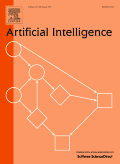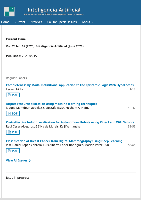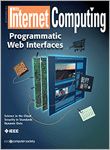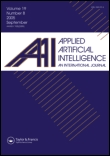
ARTIFICIAL INTELLIGENCE
Scope & Guideline
Unraveling the Complexities of AI Through Linguistic Insight
Introduction
Aims and Scopes
- Foundational AI Theories and Models:
The journal publishes research on the theoretical underpinnings of AI, including algorithm design, computational models, and formal logic frameworks that support the development of intelligent systems. - Machine Learning and Data Mining:
A significant focus is on machine learning techniques, including supervised, unsupervised, and reinforcement learning, as well as advances in data mining methodologies that enhance AI capabilities. - AI and Decision Making:
Research on decision-making processes in AI, particularly in uncertain environments, including planning, optimization, and game theory, is a core area of interest. - Human-AI Interaction and Explainability:
The journal emphasizes the importance of explainability in AI systems, exploring how AI can effectively communicate its reasoning and decisions to users. - Applications of AI in Various Domains:
The journal covers the application of AI technologies across various fields such as healthcare, finance, robotics, and social networks, showcasing innovative solutions to real-world challenges. - Ethics and Social Implications of AI:
Acknowledging the societal impact of AI, the journal addresses ethical considerations, fairness, transparency, and the implications of AI technologies on society.
Trending and Emerging
- Neurosymbolic AI:
Recent papers indicate a growing interest in neurosymbolic approaches that combine neural networks with symbolic reasoning, aiming to create more interpretable and robust AI systems. - Ethics and Fairness in AI:
There is an increasing focus on the ethical implications of AI, including fairness, accountability, and transparency, as researchers seek to address the societal impacts of AI technologies. - Explainable AI (XAI):
The trend towards explainable AI continues to grow, with research dedicated to developing methods that enhance the interpretability of AI models and their decision-making processes. - Reinforcement Learning in Complex Environments:
Advancements in reinforcement learning, particularly in multi-agent settings and applications in dynamic environments, are becoming more prevalent in recent publications. - Integration of AI with Other Disciplines:
Emerging interdisciplinary research that integrates AI with fields such as cognitive science, social sciences, and robotics is gaining traction, reflecting a holistic approach to understanding and applying AI. - AI for Social Good:
There is an increasing emphasis on applying AI to address global challenges, such as climate change, healthcare accessibility, and social equity, indicating a commitment to using AI for positive societal impact.
Declining or Waning
- Traditional Rule-Based Systems:
There has been a noticeable decrease in publications related to traditional rule-based AI systems, as the field has shifted towards more data-driven and machine learning approaches. - Basic Theoretical Foundations Without Novel Applications:
Papers that only address theoretical concepts without practical applications or advancements in methodology seem to be less frequent, indicating a shift towards applied research. - Limited Focus on Low-Level AI Techniques:
Research centered on low-level AI techniques, such as basic algorithm implementations without innovative enhancements, is becoming less common as the field progresses towards more complex and integrated systems.
Similar Journals

AI MAGAZINE
Pioneering Discoveries in Artificial Intelligence.AI MAGAZINE, published by the American Association for Artificial Intelligence, serves as a pivotal resource in the field of artificial intelligence. With an established history since 1984 and convergence periods highlighting its adaptability, the journal remains integral for sharing significant advancements and research findings. Housed in the United States, it provides a comprehensive platform for professionals, researchers, and students alike, delving into topics such as machine learning, natural language processing, and intelligent systems. Despite its current Q3 ranking in the Artificial Intelligence category, AI MAGAZINE sustains a significant impact through its diverse range of articles aimed at bridging the gap between theory and application. Although it is not an open-access journal, it continues to nurture a vibrant academic community, encouraging the exchange of knowledge and innovation in this rapidly evolving domain.

Inteligencia Artificial-Iberoamerical Journal of Artificial Intelligence
Connecting Minds Through Open Access Scholarship.Inteligencia Artificial-Iberoamerican Journal of Artificial Intelligence, published by the ASOC ESPANOLA INTELIGENCIA ARTIFICIAL, serves as a pivotal platform for disseminating cutting-edge research in the burgeoning fields of artificial intelligence and software development. Established in 1997 as an Open Access journal, it ensures broad accessibility to its scholarly content, thus fostering collaboration and knowledge exchange amongst researchers, professionals, and students across the globe. Based in Valencia, Spain, the journal currently operates within a significant timeline spanning from 2004 to 2010 and 2012 to 2024, enabling continual contributions to the academic discourse. Although it holds a Q4 quartile ranking in both the Artificial Intelligence and Software categories and a notable yet competitive Scopus ranking among its peers, the journal remains committed to advancing the understanding and application of sophisticated AI methodologies. As it continues to embrace innovative research, this journal stands as a crucial reference point for those keenly navigating the complexities of artificial intelligence in a rapidly evolving digital landscape.

IEEE INTERNET COMPUTING
Leading the Way in Internet Computing ResearchIEEE Internet Computing is a prominent journal in the field of computer networks and communications, published by the esteemed IEEE Computer Society. With an impressive impact factor and ranking in the Q1 category for 2023, it stands out as a vital resource for researchers, professionals, and students alike, seeking to delve into the latest advancements and trends in internet computing. Since its inception in 1997, the journal has provided a platform for pioneering studies and insightful discussions that bridge theory and practice in the rapidly evolving digital landscape. The journal is indexed with an excellent Scopus rank of #77 out of 395, placing it in the 80th percentile of its category, which underlines its relevance and influence in the academic community. While it currently does not offer Open Access options, its rich archive of scholarly articles remains accessible to those affiliated with research institutions and libraries. Furthermore, the journal's comprehensive coverage continues through 2024, ensuring it remains at the forefront of the discipline.

Machine Learning and Knowledge Extraction
Unlocking Knowledge Through Innovative ResearchMachine Learning and Knowledge Extraction, published by MDPI, is an esteemed Open Access journal that has been at the forefront of disseminating cutting-edge research since its inception in 2019. Based in Switzerland, this journal has established itself as a significant contributor to the fields of Artificial Intelligence and Engineering, currently ranking in the Q2 category in Artificial Intelligence and Q1 in Engineering (miscellaneous) for 2023. With a notable Scopus ranking, it holds the 35th position out of 204 in Engineering, placing it in the 83rd percentile, while it ranks 127th out of 350 in Computer Science, reaching the 63rd percentile. Machine Learning and Knowledge Extraction serves as a vital platform for researchers, professionals, and students alike, promoting insightful discussions, innovative methodologies, and profound discoveries in machine learning and data extraction techniques. The journal's open access model ensures that groundbreaking research is widely accessible, fostering collaboration and advancing knowledge across various disciplines.

APPLIED ARTIFICIAL INTELLIGENCE
Showcasing Groundbreaking Research in AIAPPLIED ARTIFICIAL INTELLIGENCE, an esteemed journal published by Taylor & Francis Inc, serves as a vital platform for sharing groundbreaking research and advancements in the field of artificial intelligence. With an E-ISSN of 1087-6545, this Open Access journal since 2022, offers scholars the opportunity to disseminate their findings widely, increasing visibility and accessibility in the academic community. With a history dating back to 1987, the journal features a compelling Q3 category ranking in Artificial Intelligence and holds respectable placement in Scopus rankings, emphasizing its relevance and contribution to both Electrical and Electronic Engineering and Computer Science. Targeted at researchers, industry professionals, and students, APPLIED ARTIFICIAL INTELLIGENCE is dedicated to promoting innovation and fostering dialogue on the practical applications of AI technologies, making it an indispensable resource for anyone striving to advance their knowledge and expertise in this rapidly evolving domain.

DATA MINING AND KNOWLEDGE DISCOVERY
Harnessing Innovation to Decode Complex Data SystemsDATA MINING AND KNOWLEDGE DISCOVERY, published by Springer, stands as a premier journal within the realms of Computer Networks and Communications, Computer Science Applications, and Information Systems. With an impressive impact factor and a notable presence in various rankings—achieving the Q1 category in 2023—we invite researchers, professionals, and students alike to explore cutting-edge methodologies and innovative applications in data mining. Established in 1997 and continuing its journey through to 2024, the journal not only contributes significantly to the advancement of knowledge in computational techniques but also fosters an understanding of the complex interrelations in data systems. Though not an open access publication, it offers a wealth of insights crucial for driving advancements in technology and analytics. Based in Dordrecht, Netherlands, the journal remains dedicated to disseminating high-quality research and is essential reading for anyone engaged in the ever-evolving field of data science.

Machine Intelligence Research
Championing Open Access for Groundbreaking DiscoveriesMachine Intelligence Research is a premier academic journal published by SPRINGERNATURE, dedicated to advancing knowledge in the rapidly evolving fields of Artificial Intelligence, Applied Mathematics, and more. With its ISSN 2731-538X and E-ISSN 2731-5398, the journal is recognized for its impact, holding a distinguished position in various Q1 categories for 2023, including Computer Vision and Pattern Recognition and Control and Systems Engineering. Operating under an Open Access model, it ensures that groundbreaking research from China and around the world remains accessible to a global audience, promoting collaboration and innovation. As a beacon for researchers, professionals, and students, Machine Intelligence Research aims to disseminate high-quality research findings, innovative methodologies, and influential theories, thereby shaping the future landscapes of science and technology.

Applied System Innovation
Pioneering Advances in Technology and EngineeringApplied System Innovation is a leading multidisciplinary journal published by MDPI, dedicated to advancing the fields of applied mathematics, artificial intelligence, control systems, human-computer interaction, and industrial and manufacturing engineering. With an impressive Open Access model established since 2018, it ensures that research findings are readily accessible to a global audience, fostering collaboration and innovation. The journal, boasting a robust impact in academia, has achieved multiple distinguished quartile rankings for 2023, including Q1 in Industrial and Manufacturing Engineering and Q2 in several other key disciplines. It is recognized in various Scopus categories, with notable rankings in applied mathematics and control systems. By encouraging high-quality research and providing a platform for knowledge exchange, Applied System Innovation plays a vital role in shaping the future of technology and engineering solutions. We invite researchers, professionals, and students alike to contribute to this dynamic field through impactful publications that inspire advancements in our understanding of complex systems.

MINDS AND MACHINES
Illuminating the Future of Intelligent TechnologiesMINDS AND MACHINES is a distinguished peer-reviewed journal published by Springer, specializing in the interdisciplinary realms of Artificial Intelligence and Philosophy. Founded in 1991, this journal continues to serve as a critical forum for exploring the intricate relationships between human cognition, artificial systems, and ethical considerations in technology. With an impressive impact factor positioned in the Q1 quartile for both the fields of Artificial Intelligence and Philosophy, MINDS AND MACHINES ranks as a top-tier publication, reflecting its significant contributions to ongoing scholarly discussions. The journal is indexed in Scopus, where it holds the number one rank in Philosophy within the Arts and Humanities category, and the 42nd position in the Computer Science segment for Artificial Intelligence, demonstrating its wide-reaching influence and high citation impact. Although it does not offer open access, its rigorous selection process ensures that only high-quality manuscripts are published, making it an essential read for researchers, professionals, and students aiming to stay at the forefront of developments in these rapidly evolving fields.

IEEE Computational Intelligence Magazine
Exploring the Frontiers of Computational IntelligenceIEEE Computational Intelligence Magazine, published by the esteemed IEEE-INST ELECTRICAL ELECTRONICS ENGINEERS INC, is an essential resource for researchers and professionals in the fields of Artificial Intelligence and Theoretical Computer Science. With a robust Q1 ranking in both categories for 2023, this magazine stands out as a leader in disseminating cutting-edge research and innovative applications within computational intelligence. As an invaluable conduit for knowledge, it covers a diverse range of topics, including but not limited to machine learning, neural networks, and data mining. The magazine is particularly recognized for its interdisciplinary approach, bridging gaps between theory and application while contributing to advancements in technology and society. Although it does not offer open access, the insights provided are critical for staying at the forefront of this rapidly evolving discipline. Join a community of like-minded scholars and practitioners by exploring the latest findings and trends published from 2006 to 2024, operating from its headquarters at 445 Hoes Lane, Piscataway, NJ, United States.